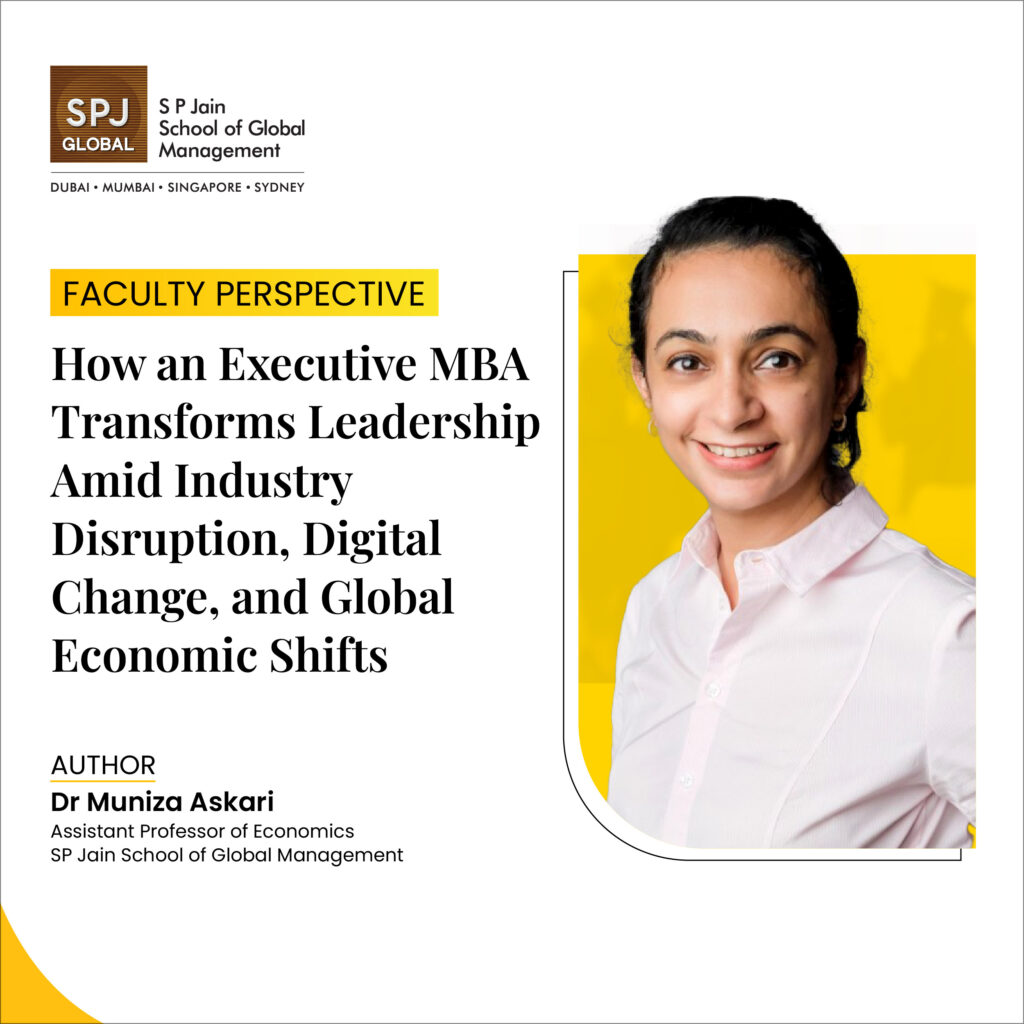How an Executive MBA Transforms Leadership Amid Industry Disruption, Digital Change, and Global Economic Shifts

Why economic literacy and digital fluency are now core to executive leadership
Today’s executive leaders face a convergence of challenges: industry disruption, technological acceleration, and volatile economic environments. From AI-powered innovation to geopolitical tensions and shifting trade regimes, leadership now demands more than intuition and experience. It calls for rigorous economic thinking, strategic agility, and digital fluency.
An Executive MBA (EMBA) prepares professionals to lead amid this uncertainty. It develops the analytical mindset and adaptive leadership capabilities required to thrive in an increasingly complex, digitally enabled, and economically fragmented world.
1. Navigating Global Trade Realignments and Tariff Regimes
In today’s fragmented global economy, executives must contend with rising tariffs, shifting trade blocs, and localised supply chains. Trade policy has moved from the periphery to the heart of business strategy.
Leaders who understand how these dynamics affect sourcing, pricing, and investment flows are better positioned to adapt and thrive. An EMBA helps executives develop a nuanced grasp of international trade theory and real-world policy changes—turning economic volatility into a strategic advantage.
2. Economic Thinking as a Core Leadership Competency
Effective leadership in this environment requires more than operational know-how—it requires thinking like an economist. Whether it’s reading central bank signals, interpreting inflation data, or weighing investment trade-offs under uncertainty, leaders must develop the ability to connect macroeconomic trends with firm-level decisions.
Through modules on financial policy, risk, and strategic decision-making, an EMBA equips professionals with this exact skill set.
3. Leading Digital Transformation with Economic Foresight
Digital transformation isn’t just a technological shift—it’s an economic one. AI, automation, and data platforms disrupt cost structures, labour markets, and consumer expectations.
Business leaders need to understand how these changes affect value creation, not just IT infrastructure. An EMBA gives executives the economic frameworks to evaluate technology investments, forecast labour transitions, and guide innovation strategy in an increasingly digital world.
4. Data-Driven Decision-Making in an Uncertain World
The speed and scale of today’s disruptions demand precision. Inflation, interest rate fluctuations, and geopolitical instability can reshape markets overnight.
Leaders must rely on more than instinct—they need robust data and disciplined models to steer their organisations. An EMBA strengthens this analytical capacity through training in quantitative modelling, scenario analysis, and decision-making under uncertainty.
5. Strategic Vision for a Reordered Global Economy
The global economic order is being redefined: industries are realigning, capital is becoming more regulated, and new geopolitical risks are emerging.
For executives, this demands a wide-angle view that connects policy shifts with corporate outcomes. An EMBA develops systems thinkers: leaders who integrate economic foresight, industry trends, and strategic planning to build resilient, forward-looking businesses.
Conclusion
An Executive MBA is no longer just a career accelerator—it is a transformation engine for leadership in a world defined by economic shifts, digital acceleration, and industry realignment.
For executives who want to lead change instead of reacting to it, the EMBA offers both the theory and the toolkit. It produces leaders who are not only fluent in technology and strategy but also grounded in economics—ready to navigate tariffs, trade, capital markets, and currency shocks with insight and confidence. That is the kind of leadership the future demands.
Learn how SP Jain School of Global Management Executive MBA prepares leaders for the future. Explore the curriculum, global immersion experiences, and strategic leadership modules on our EMBA program page.
Author’s Description
Muniza Askari is an Assistant Professor of Economics at SP Jain School of Global Management, Singapore Campus. Her work explores decision-making under uncertainty, with a focus on integrating behavioural insights into real-world economic and business challenges.




